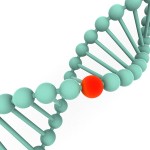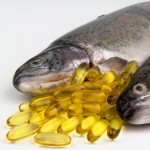Are Clouds Gathering For the Sunshine Vitamin?
Author: Dr. Stephen Chaney
 We’ve known for years that vitamin D plays an essential role in calcium metabolism and is important for bone health. In fact, the use of vitamin D to prevent and cure rickets is one of the greatest success stories in the field of nutrition.
We’ve known for years that vitamin D plays an essential role in calcium metabolism and is important for bone health. In fact, the use of vitamin D to prevent and cure rickets is one of the greatest success stories in the field of nutrition.
However, in recent years a number of studies have suggested that adequate vitamin D status was also important in reducing the risk of cancer, heart disease, diabetes, infectious diseases and autoimmune diseases – as well as overall mortality. Suddenly it seemed as if vitamin D could leap over tall buildings in a single bound (I realize that I’m probably dating myself with that analogy).
So when I saw the headlines about a new study (Theodoratou et al, BMJ, 2014;348:g2035 doi: 10.1136/bmj.g2035) that concluded all of those benefits of vitamin D were unconfirmed, I was not surprised. After all there have been many examples of periods in which individual vitamins were reported to have miraculous benefits – only to have most of those benefits debunked by subsequent studies. I fully expected that would be the theme of this issue of “Health Tips From the Professor”.
But when I read the article I found that the study had multiple flaws (more about that latter). I also discovered that the same issue of the British Medical Journal had another, much better designed, study that came to the exact opposite conclusion (Chowdhury et al, BMJ 2014;348:g1903 doi: 10.1136/bmj.g1903).
Funny how only the first study made it into the headlines. It’s only the negative news that sells.
Is Vitamin D Overhyped?
The first study was a very large meta-analysis that included 107 systematic reviews, 74 meta-analyses of observation studies (studies that compare population groups) and 87 meta-analyses of randomized, placebo controlled trials. In case you were wondering, the total number of patients enrolled in these studies must have numbered in the hundreds of thousands.
The authors of the study reported that:
- There was no relationship between vitamin D intake and cancer, heart disease, autoimmune disease, infectious diseases, diabetes and other diseases. In other words, they concluded that most of the recent excitement about vitamin D was just hype.
- There was also no evidence that vitamin D increased bone density or reduced the risk of fractures and falls in older people – in contrast to many previous studies.
Based on this evidence the authors said “universal conclusions about vitamin Ds benefits cannot be drawn [from current data]” and that vitamin D “might not be as essential as previously thought in maintaining bone mineral density”.
Both of those statements are pretty revolutionary, but a study this large has to be true – right? The answer is a definite maybe. The problem is that many of the studies included in this meta-analysis were poorly designed by today’s standards. Remember the old saying “garbage in, garbage out”.
The Study Is Flawed
My specific criticisms of the study are:
1) The conclusions about vitamin D and bone density were seriously flawed. The authors acknowledged that previous studies have shown that calcium and vitamin D together increased bone density, but they considered calcium to be a confounding variable and only included clinical trials using vitamin D supplementation alone. That shows a complete misunderstanding of the biochemical role of vitamin D.
The purpose of vitamin D is to maintain constant levels of blood calcium, not to build strong bones.
- When blood levels of calcium are high, vitamin D lowers it by depositing the calcium in bones.
- When blood levels of calcium are low, vitamin D raises it by leaching calcium from bone.
That’s why vitamin D and calcium work together. It is utter nonsense to expect vitamin D to increase bone density or prevent fractures unless you make sure that calcium intake is at least adequate.
2) Most studies of vitamin D supplementation did not stratify the data based on low versus high levels of 25-hydroxy vitamin D at the beginning of the study. That’s important because you would only expect vitamin D supplementation to be of benefit in people with low levels of 25-hydroxy vitamin D to begin with. If their 25-hydroxy vitamin D levels are already optimal, vitamin D supplementation is unlikely to be of additional benefit.
3) Finally, the authors did not separate the studies based on whether vitamin D2 or vitamin D3 was used. That’s important because some recent studies have suggested that D3 is more beneficial than D2.
Is Vitamin D Beneficial After All?
 The second study came to the exact opposite conclusions. It was also a very large study. It included 73 observational studies (849,412 participants) and 22 randomized, placebo controlled studies (30,716) participants. Here is what the authors of this study concluded.
The second study came to the exact opposite conclusions. It was also a very large study. It included 73 observational studies (849,412 participants) and 22 randomized, placebo controlled studies (30,716) participants. Here is what the authors of this study concluded.
- High blood levels of 25-hydroxy vitamin D decreased the risk of heart disease by 35%, cancer by 14% and overall mortality by 35%.
- Supplementation with vitamin D3 reduced overall mortality by 11%, while supplementation with vitamin D2 increased overall mortality by an insignificant 4%.
- 65% of the US population can be classified as vitamin D insufficient (blood levels of 25-hydroxy vitamin D of below 30 ng/ml) and 4% as severely deficient in vitamin D (blood levels below 10 ng/ml)
- Vitamin D deficiency contributes to 13% of the deaths in the United States. For comparison the corresponding numbers for other major risk factors are: smoking – 20%, physical inactivity – 11% and alcohol – 9%.
- About the only point on which the two studies agreed was that there is a need for more, better designed studies to clarify the benefits of vitamin D.
The Bottom Line:
1) Two studies were published in the April 2014 issue of the British Medical Journal. The first concluded that all of the supposed benefits of vitamin D – including increasing bone density – were not supported by the available data. The second study concluded that adequate intake of vitamin D significantly reduced deaths due to heart disease and cancer and also significantly reduced overall mortality. Somehow, only the first study made it into the headlines. Why does that not surprise me?
2) The suggestion in the first study that vitamin D may not be essential for strong bones is based on a complete misunderstanding of the role of vitamin D in the body. There are ample clinical studies showing that vitamin D and calcium together are essential for strong bones. Nobody who understands biochemistry would expect vitamin D to increase bone density in the absence of calcium, but the authors only considered studies that excluded calcium in drawing their conclusion that vitamin D did not increase bone density.
3) The only point of agreement between the two studies is that more and better studies are needed to sort out the benefits of vitamin D and what levels of vitamin D are optimal. I wholeheartedly agree.
4) My advice is to ignore the headlines telling you that vitamin D is dead. On the other hand, don’t get caught up in the hype and buy megadoses of vitamin D supplements. While the evidence is rock solid that vitamin D and calcium together are essential for strong bones, the jury is still out on some of the other health benefits of vitamin D.
5) If you are supplementing with vitamin D you should know that the RDAs for vitamin D are 600 IU for ages 1-70 and 800 IU over 70. The safe upper limit has been set at 4,000 IU. You should only go above that on a doctor’s advice.
6) However, people metabolize vitamin D with different efficiencies, so I strongly recommend that you get your blood levels of 25-hydroxy vitamin D tested and let your doctor help you determine how much vitamin D you should be getting.
7) Finally, a number of recent studies suggest that vitamin D3 may be more effective than vitamin D2, so I only recommend supplements that contain D3.
These statements have not been evaluated by the Food and Drug Administration. This information is not intended to diagnose, treat, cure or prevent any disease.












